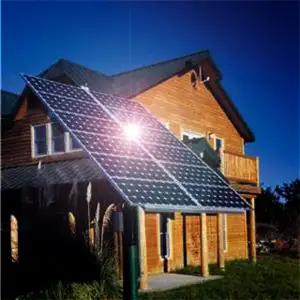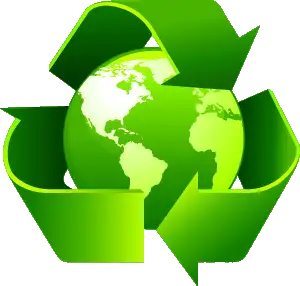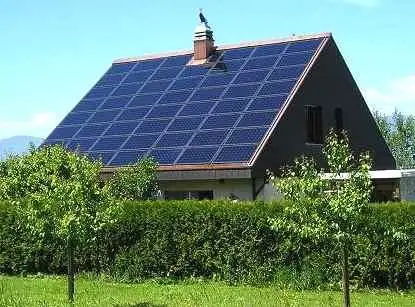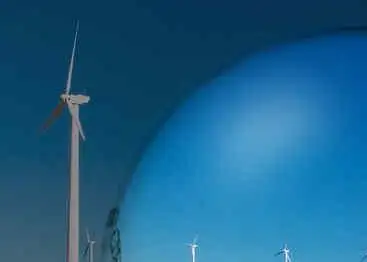Alternative Energy Projects - Home Energy Systems

Alternative energy projects integrate solar PV, wind turbines, battery storage, and smart grid controls, using power electronics, inverters, and HVDC to optimize grid integration, reliability, and decarbonization in electrical engineering applications.
What Are Alternative Energy Projects?
Projects deploying renewables and storage with power electronics to ensure efficient, reliable grid integration.
✅ Solar PV, wind, and storage integrated via power converters
✅ Smart inverters, MPPT, and grid-forming control strategies
✅ HVDC links, microgrids, and protection coordination
Alternative energy projects are technologies that use alternative energy sources (wind energy, solar energy, among others) instead of conventional fossil fuels that damage the environment with toxic greenhouse (GHG) emissions. Natural Resources Canada (NRCAN) and the Department of Energy (DOE) are among some of the North American governmental organizations looking for ways to use alternative energy sources. While using the alternative energy source is important, so is educating the public about ways that they can someday use future alternative energy projects. Here are some energy systems the government is working on for your home: For a concise primer on definitions and policy context, see what alternative energy means to better frame the technologies discussed below.
Alternative Energy Projects - Home Solar Photovoltaic (PV) Systems
As one of several major categories, the forms of alternative energy place solar alongside wind, geothermal, and hydrogen options for residential planning.
This alternative energy project is a great way to preserve Earth's fossil-fuel resources and an efficient way to reduce air pollution. Another benefit of home PV systems is that it reduces the amount of power bought from local utilities thus making the residence less vulnerable to fluctuating price increases. A drawback to a home PV system are the extremely high installation costs, however, funding could be available from governments as an incentive to invest in alternative power. Unobstructed and clear access to the sun’s rays for most or all of the day is required throughout the year for well-designed PV systems. Location affects performance meaning that the roof of a house must be facing south (best option), east or west. Flat roofs are great options for solar electric systems because the PV modules are flat on the roof facing the sky or mounted on frames on an optimal angle facing south. One option for commercial application includes building structures that can create provide shade (such as window awnings) or covered parking. For homeowners evaluating PV feasibility, a detailed guide to solar power clarifies system sizing, orientation, and incentive considerations.
Alternative Energy Projects - Solar Concentrator System
Solar concentrators are alternative energy projects that track and focus the sun's energy; the sun's energy is then converted to hot water and space heat for day-to-day consumption. These alternative energy projects also have thermal storage, so it can distribute the sun's energy during the night or during a cloudy day. In addition to thermal applications, alternative energy power resources explain how concentrators integrate with broader energy management strategies.
Alternative Energy Projects - Hydrogen Electrolyzer
Hydrogen could be a valuable energy source in the future, so alternative energy projects are being funded by governments to heat residential homes. One such project, the hybrid hydrogen electrolyzer/high efficiency furnace system works by generating hydrogen from water using electricity. The generated hydrogen is then used to replace the natural gas that is conventionally used in furnaces. These hybrid energy systems can be installed in a variety of houses, including single detached houses. For system comparisons and component basics, an overview of alternative energy systems outlines how electrolyzers interface with storage and heating equipment.
Alternative Energy Projects - Geo Power
Geothermal Energy is also being used to provide heat to residential homes. One such alternative energy project, known as the Geo Power System, takes heat from the ground and sends it into the house. This tube-in-tube ground heat exchanger, made from polyethylene and aluminum is inserted vertically into a bore-hole in the ground either in the basement or crawlspace of a house. The alternative energy project is supposed to contribute energy during the winter months and absorb energy during the summer months in the ground. For site assessment and retrofit pathways, these alternative energy solutions highlight best practices for efficient geothermal installations.
Alternative Energy Projects - Solid-Oxide Fuel Cells
Fuel-cell combined heat and power (CHP) systems are alternative energy projects that can heat houses and provide hot water while electricity is sent to and from the electricity grid. The continued issues this residential alternative energy project faces include grid connection, thermal storage and proper fuel-cell size. To see how residential CHP fits within the wider clean energy mix, a primer on renewable and alternative energy offers context on adoption trends and grid impacts.










